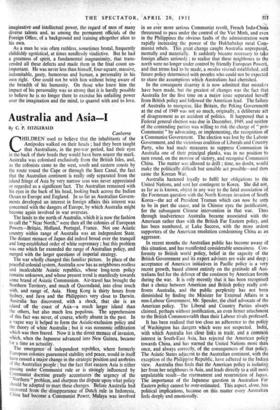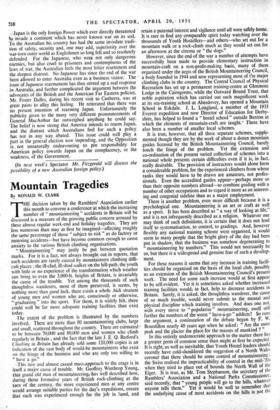Australia and Asia —I
By C. P. FITZGERALD
Canberra CHILDREN 'used to believe that the inhabitants of the Antipodes walked on their heads ; had they been taught that Australians. in the pre-war period, had their eyes in the back of their heads they would have been nearer the mark. Australia was colonised exclusively from the British Isles, and, as the colonists came to the west, south and eastern coasts by the route round the Cape or through the Suez Canal, the fact that the Australian continent is really only separated from the island fringe of Asia by very narrow seas was never appreciated or regarded as a significant fact. The Australian remained with his eyes in the back of his head, looking back across the Indian Ocean to Europe and England. In so far as Australian Govern- ments developed an interest in foreign affairs this interest was concerned with the dangers of Europe, by which Australia might become again involved in war overseas. The lands to the north of Australia, which it is now the fashion to call the "Near North," were then all the colonies of European Powers—Britain, Holland, Portugal, France. Not one Asiatic country within range of Australia was an independent State. The distant menace of Japan did indeed brood over the tranquil and long-established order of white supremacy ; but this problem was one which far exceeded the range of Australian policy, and merged with the larger questions of imperial strategy. The war wholly changed this familiar picture. In place of the peaceful colonial system. Australia now has as neighbours restless and incalculable Asiatic republics, whose long-term policy remains unknown, and whose present trend is manifestly towards some brand of Asiatic Communism. Air-travel has brought the Northern Territory, and much of Queensland, into close touch with, and range of, Asia. Hong Kong is thirty hours from Sydney, and Java and the Philippines very close to Darwin. Australia has discovered, with a shock. that she is an island off the coast of Asia—a much larger island than the others, but also much less populous. The apprehension of this fact was never, of course, wholly absent in the past. In a vague way it helped to form the Asiatic-exclusion policy and the. theory of white Australia ; but it was economic infiltration which was then feared. Now it is the direct menace of invasion, which, when the Japanese advanced into New Guinea, became for a time an actuality. The emergence of independent republics, where formerly European colonies guaranteed stability and peace, would in itself have caused a major change in the strategic position and anxteties of the Australian people ; but the fact that eastern Asia is either passing under Communist rule or is strongly influenced by Communist doctrine greatly accentuates the urgency of the Northern " problem, and sharpens the dispute upon what policy should be adopted to meet these changes. Before Australia had recovered from the 'disappearance of Dutch rule in Indonesia, China had become a Communist Power, Malaya was involved in an ever more serious Communist revolt, French Indo-Chiek threatened to pass under the control of the Viet Minh, and even in the Philippines the obvious faults of the administration werb rapidly increasing the power of the Hukhabalap rural Com- munist rebels. This great change caught Australia unprepared, mentally and materially. It suddenly became necessary to tae foreign affairs seriously ; to realise that these neighbours to the north were no longer under control by friendly European Power* and that terms had to be made, a modus vivendi established, and 'future policy determined with peoples who could not be expected to share the assumptions which Australians had cherished.
In the consequent disarray it is now admitted that mistakes have been made, but the greatest of changes was the fact that Australia for the first time on a major issue separated herself- from British policy and followed the American lead. The failurb of Australia to recognise, like Britain, the Peking Governmerit at the end of 1949 was not so much, originally, a deliberate id of disagreement as an accident of politics. It happened that a Federal general election was due in December, 1949, and neither of the contending parties was willing to risk the charge of " pro- Communist " by advocating, or implementing, the recognition Of a Communist Government. The election was lost by the Labotrr Government, and the victorious coalition of Liberals and Countty Party, who had made measures to suppress Communism ih Australia one of their principal planks, was in no position 'to turn round, on the morrow of victory, and recognise Communist China. The matter was allowed to drift ; time, no doubt, would make the politically difficult but sensible act possible—and theft came the Korean War.
Australia hastened loyally to fulfil her obligations to th United Nations, and sent her contingent to Korea. She did net, as far as is known, object in any way to the fatal association of the Formosan question with the North Korean invasion of South Korea—the act of President Truman which can now be seeft to be in part the cause, and in Chinese eyes the justificatidr . for the subsequent Chinese intervention in that war. Tints through inadvertence Australia became associated with the American rather than with the British Far Eastern policy, and has been numbered, at Lake Success, with the more ardent supporters of the American resolution condemning China as att aggressor.
In recent months the Australian public has become aware Of this situation, and has manifested considerable uneasiness. Con- formity to British world policy, belief in the sagacity of the British Government and its expert advisers are wide and deep; acceptance of American initiatives in Pacific policy is a very recent growth, based almost entirely on the gratitude all Aus- tralians feel for the defence of the continent by American foreels during the war. It is only recently that it has been recognised that a choice between American and British policy really con- fronts Australia, and the public perplexity has not beets diminished by finding the Minister for External Affairs in a non-Labour Government, Mr. Spender, the chief advocate of the American policy. The Liberal and Country Parties always claimed, perhaps without justification, an even firmer attachment to the British Commonwealth than their Labour rivals professed. It has been realised that too close an adherence to the poll of Washington has dangers which were not suspected. Indi with which Australia has close links in trade, and a commiih interest in South-East Asia, has rejected the American policy towards China, and has warned the United Nations more thih once, and always correctly, of the consequences of that policy. The Asiatic States adjacent to the Australian continent, with the exception of the Philippine Republic, have adhered to the Indian view. Australia thus finds that the American policy is isolatinh her from her neighbours in Asia, and leads directly to a still mire unpalatable result—the rearmament and resurrection of Japan. The importance of the Japanese question in Australian Far Eastern policy cannot be over-estimated. This aspect, alone, has political implications, because on this matter every Australian feels deeply and emotionally. • -Japan is the only foreign Power which ever directly threatened to invade a continent which has never known war on its soil. To the Australian his country has had the same inviolate tradi-. tion of safety, security and, one may add, superiority over the war-torn outer world as Englishmen so long felt and so resolutely defended. For the Japanese, who were not only dangerous enemies, but also cruel to prisoners and contemptuous of the laws of war, the Australian feels the most bitter resentment and the deepest distrust. No Japanese has since the end of the war been allowed to enter Australia even as a business visitor. The issue of Japanese rearmament has thus stirred up a real response in Australia, and further complicated the argument between the advocates of the British and the American Far Eastern policies. M. Foster Dulles, during his recent visit to Canberra, was at great pains to allay this feeling. He reiterated that there was no present intention of rearming Japan. Unfortunately the publicity given to the many very different pronouncements of General MacArthur far outweighed anything he could say. The belief is now strong that America intends to rearm Japan, and the distrust which Australians feel for such a policy has not in any way abated. This issue could well play a part in the general election now impending, and the Opposition is , not unnaturally endeavouring to pin responsibility for American policy towards Japan on the complacency, or the weakness, of the Government.



































 Previous page
Previous page